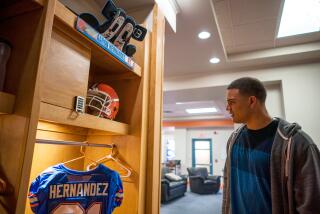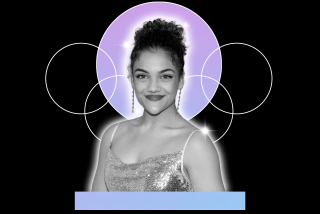Patriots quickly cut ties with Aaron Hernandez after his arrest
In the five-hour span Wednesday between the arrest of Aaron Hernandez and his arraignment on charges including first-degree murder, the New England Patriots did something seldom seen in sports — the team distanced itself and severed all ties with him even before the first steps of the legal process.
By releasing the talented tight end, the Patriots possibly missed a chance to recover a portion of his $12.5-million signing bonus. But they sent an unmistakable message that the club wanted nothing to do with him. It was a rare departure from the way teams typically handle star athletes in serious trouble.
“Words cannot express the disappointment we feel knowing that one of our players was arrested as a result of this investigation,” the team said in a written statement. “We realize that law enforcement investigations into this matter are ongoing. We support their efforts and respect the process. At this time, we believe this transaction is simply the right thing to do.”
The Patriots promptly removed Hernandez from the roster on their website, and the NFL in turn stopped selling his jersey online.
“We felt it was the appropriate step to take under these circumstances,” league spokesman Brian McCarthy said.
Earlier in the day, Hernandez, 23, was handcuffed and taken by police from his home in North Attleborough, Mass. He was charged with murder in the shooting death of a friend, Odin Lloyd, who prosecutors said angered Hernandez in a Boston nightclub a few nights earlier by talking to the wrong people.
Hernandez showed little emotion in Attleborough District Court as he heard the charges, murder plus five illegal firearms charges. Lloyd’s family members hugged and cried throughout as prosecutor Bill McCauley described the killing. Lloyd, a 27-year-old semipro football player, was shot five times, including once while he was on the ground, desperately raising his hand trying to save his life, the prosecutor said. Five .45-caliber shell casings were recovered, the prosecutor said.
McCauley said Hernandez “orchestrated this execution,” and was accompanied by two men, whose identities have not been disclosed. Hernandez entered a plea of not guilty and bail was not granted.
The startling action by the Patriots ran counter to a process in which professional teams typically wait for the legal wheels to turn before making dramatic decisions, particularly when it comes to standout players. Teams routinely give their stars the benefit of the doubt, even if most of the outside world does not. Star athletes such as Ray Lewis, Ben Roethlisberger and Kobe Bryant were all retained by their teams despite serious legal turbulence. Hernandez was gone in a flash.
Said former NFL coach Brian Billick, now an NFL Network analyst: “For them to cut him adrift as quickly as they did — and you’ve got to know that decision wasn’t made [Wednesday] morning but it’s been made over the last week, waiting for the eventual arrest of Aaron Hernandez — is stunning and telling in the swiftness in which it came.”
The details that emerged from Wednesday’s arraignment painted a grim picture of the final hours of Lloyd’s life.
McCauley said the seeds of the murder were planted on Friday, June 14, at a Boston nightclub. He said Hernandez was upset that Lloyd had spoken to people the Patriots player “had troubles with.”
Two days later, the prosecutor said, Hernandez texted two friends from out of state, asking them to hurry back to Massachusetts. Surveillance footage from outside Hernandez’s home showed him leaving with a gun, and he told someone in the house that he was upset and couldn’t trust anyone anymore, McCauley said.
According to the prosecution, Hernandez and his two friends drove to Lloyd’s home in Boston in the early morning hours of June 17, picked him up and drove him south to North Attleborough. As they drove, the men discussed what happened at the nightclub, and Lloyd was getting nervous, McCauley said.
Lloyd sent a text message to his sister: “Did you see who I am with?”
She asked who, and Lloyd answered at 3:22 a.m., “NFL,” then a minute later — in his final text — “Just so you know.”
Within a few minutes, workers at an industrial park reported hearing gunshots, the prosecutor said. Surveillance videos at the park showed the men arriving in the same car that Lloyd had gotten into in Boston, McCauley said.
The prosecutor said that when Hernandez returned home at 3:30 a.m., surveillance videos at his house — shot by cameras that were later destroyed — showed him walking through the house with a pistol. No gun has been found.
McCauley said that Hernandez and friends later took the car to the rental agency. The attendant found a .45-caliber shell casing in the car and threw it out. Investigators were able to retrieve the casing from the trash and matched it to those found where Lloyd was killed.
For more than a week, the Patriots refrained from commenting on the murder investigation, even as reporters lined the street outside Hernandez’s home day after day. But that doesn’t mean the franchise was simply waiting around, hoping for morsels of information from the authorities.
“The Patriots likely have people within the organization, whether it’s security people or attorneys, trying to gather as much information as they can ... then weigh that information against the decision to release him,” said crisis communications expert Terry Fahn, a senior executive at Sitrick And Co., who has worked closely with NFL teams.
Billick was coach of the Baltimore Ravens when Lewis was indicted on two counts of murder in 2000, charges that were reduced to obstruction of justice as part of a plea agreement.
“We had to make the organizational decision whether we believed in Ray Lewis or not,” recalled Billick. “Regardless of the peripheral noise, it’s: Do you believe in the player or not? Clearly, the Patriots did not.”
More to Read
Go beyond the scoreboard
Get the latest on L.A.'s teams in the daily Sports Report newsletter.
You may occasionally receive promotional content from the Los Angeles Times.











